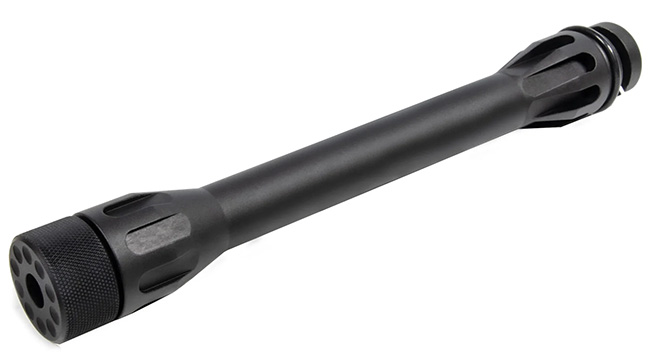
The FATS by itself.
This report covers:
- Length
- Ooops—my forgot!
- Discharge with DonnyFL Ronin
- Discharge with TalonP moderator
- Discussion
- .22 long rifle discharge
- Summary
Today we look at how effective the AirForce Airguns Fast Attach Thread System (FATS) is when used with silencers on a Condor.
Length
First I’ll show you how much length the FATS adds to the rifle. The photo of the device by itself at the top of this report looks long and some may think it adds that much length to the rifle, but it doesn’t. Since it slips over the Condor barrel it only adds about one inch to the length.
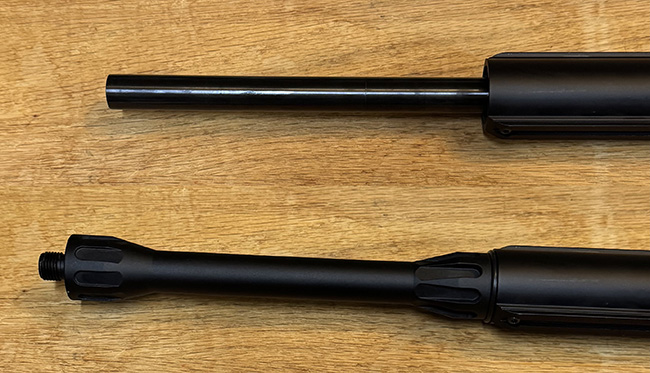
The FATS adds about an inch to the overall length of the Condor.
Ooops—my forgot!
In Part 1 I made a big deal about how loud the Condor is. I told you I bought a silencer to quiet the report. That was all true. But what I forgot was when I tested the Condor the first time I was working at AirForce Airguns and I was used to the TalonSS. Compared to it the Condor is loud. But today when I shot one the sound meter showed 97.1 dB. That’s way less than the 107 dB I got when recently testing the Umarex Komplete!
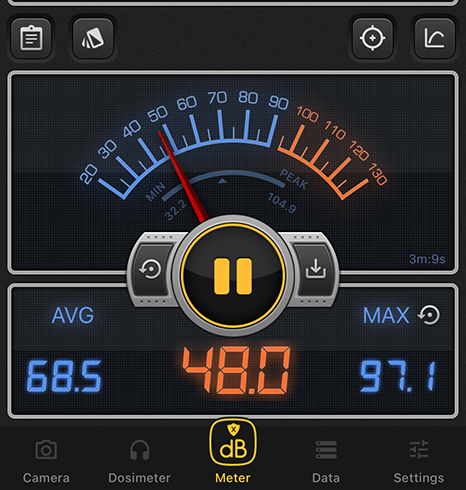
I wore noise-canceling ear protection to test the unsilenced Condor. But it wasn’t loud at all.
Discharge with DonnyFL Ronin
Next I attached my DonnyFL Ronin silencer. Now the discharge was 89.3 dB. That’s quite a bit quieter. I was still wearing my noise-cancelling ear protection so I really did not hear this shot.
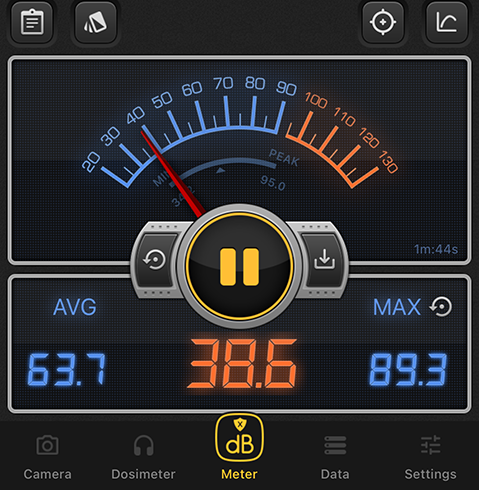
Discharge with TalonP moderator
I tested the discharge with the TalonP moderator attached next. This device is smaller than the DonnyFL Ronin, and it attenuated the discharge to 91.8 dB.
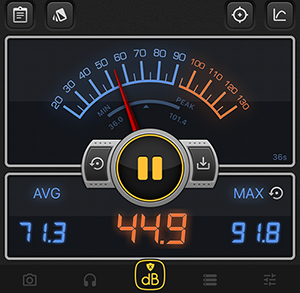
To attach this moderator you unscrew the male 1/2-inch by 20 tpi thread adaptor to reveal a 3/4-inch by 16 tpi female thread.
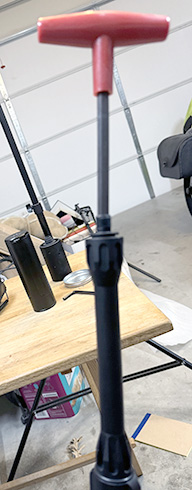
To attach the TalonP moderator unscrew the FATS adaptor insert with an 8mm Allen wrench.
This time I took off my noise-cancelling ear protection and was surprised to hear how quiet the Condor discharge was. It was definitely backyard friendly.
Discussion
This test surprised me because I remembered the Condor being very loud. It really isn’t. I thought it would be as loud as a .22 long rifle cartridge fired from a rifle. So I thought, what the heck? Why don’t I test one of those?
.22 long rifle discharge
I have a 12-inch box filled with rubber mulch and it stops a .22 long rifle bullet with ease, so there was no danger in doing this test. I expected a noise in the 120 dB range but was surprised when it only reached 111.1 dB.
This was a Federal standard-speed long rifle cartridge fired from a Remington model 33 rifle with a 24-inch barrel. At least now we have a sound level to compare to as things go forward.
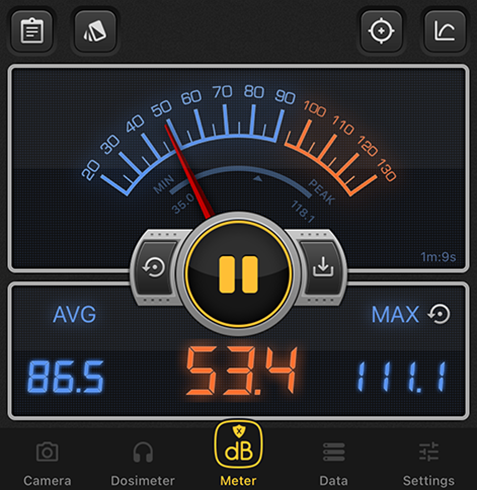
Summary
The FATS works as advertised and converts a not-as-loud-as-I-thought AirForce Condor into a pleasant backyard shooter.
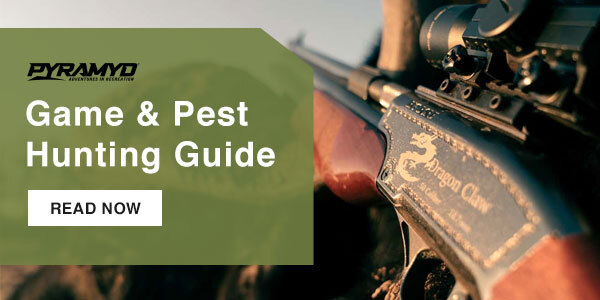
B.B.
.22’s are loud, .22 pistols are MUCH louder.
I’m always surprised how much a good moderator tames the bark of a “magnum PCP”.
-Yogi
PS to me a “magnum PCP” is .25<, 30fpe<
What do you guys think?
Yogi,
Got to remember that the long barrel also helps in dropping the resulting pressure that is following the bullet which also helps decrease the amount of noise you hear.
Siraniko
Yogi,
I was surprised how loud .177cal PCP with 23fpe can be!
Very interesting blog today!
As NVH-Mann I deal with noise analysis and measurements daily.
I think BB already explained about the noise measuring setup – should be always the same. This I will not dismantle into the last details. I think there is a good systematic in BB’s tests.
What is also important – this noise measuring device does give some sound pressure level (SPL) as a peak value. I hope only, that this is A- or even B-weighted. So, the value given would match our hearing model much better.
This value does not tell you anything about the noise spectrum. Where is the most energy in frequency domain. That’s the reason why subjective impression may be different than the comparison of two different measured peak value would show. It depends on the frequency range of the discharge and – from the hearing capability of the tested person.
Good example – first ten shots in my basement during 10 meter training with my FWB800 I usually found to be surprisingly loud. After that my ears are accommodated and my impression is quite different, it is not disturbing anymore.
Especially when shooting very loud PCP’s or firearms there is a big risk to damage the hearing in the discharge most energetic (loud) frequency range. After that, every shot in a similar frequency range will be quieter, for life.
Sound field – free or diffuse, changes a lot. When you are outside the impression is different compared to shooting same airgun in the basement.
Subjective hearing impression depends on many other, also psychological factors. The time of the day – in the morning everything will be louder than in the evening. Got eaten good meal before? Had a beer?… all will affect the loudness perception. That’s why the vehicle subjective evaluation with OEM should be done after a good meal, in the evening. The ratings are much better than after driving to the test track without breakfast 🙂 Automotive supplier small tricks 🙂
PS
Usually subjectively 10dB(A) louder would be rated as twice as loud. When the noise difference is bigger than 20dB(A) it is hard to say how much louder it was (muuuch louder).
If the silencer does 10dB(A) quieter – it would be rated as a big improvement. 20dB(A) or more would be just great. I’m talking about the noise level max range not higher than 110dB(A).
tomek,
There are many who just do not understand the workings of the dB scale. Yours is a pretty good explanation.
What many do not realize is that once your hearing is gone, it is gone. I have severe tinnitus. This is due to my being exposed to very loud guns, jet engines and loud rock and roll for many years. If it were not for my hearing aids, there would be many sounds I would not hear anymore, like the singing of the birds.
I would strongly advise everyone to do everything possible to protect your hearing. Like I said, once it is gone, it is gone.
RR,
It is exactly as you said. Unfortunately, these hearing cells will not recover once destroyed.
There are two general ways to destroy hearing:
1. (the best one) Loud transient noises like gun shots. The eardrum does not have time to create more tension to lower the amplification and critical energy portion is transmitted to the inner ear. Destroys the cells according to frequency range mostly contributed. It may be just ONE TIME if it is loud enough. Tinnitus may occur and stay…
2. Loud constant noise – depending on how loud and how long it may destroy hearing. Very loud music is the most dangerous, as it affects the entire spectrum. It means, you can destroy hearing for all frequencies at the same time. 2 hours concert can be enough to cause at least tinnitus – I’m talking about those new concerts, overpowered, killing with bass. The eardrum will build the max tension to prevent damage but it will be not enough for too long exposure.
See those kids walking everywhere with headphones?… It may not be very loud compared to a concert music, but for a long time…and almost daily. Actually round about 27% people under 35 years old have already a hearing damage.
The hearing threshold is defined as 20uPa. That’s our 0dB. Just 1 Pa of sound pressure is 94dB. Imagine how big the hearing range is if we can get a few Pa! More than a million between silence and the loudest. That’s the reason for logarithmic scaling… it causes a lot of problems with understanding.
There is a metric called loudness and the unit is [sone]. It is a complex model calculating based on our hearing model. This is both depending on the frequency and the sound pressure level. It gives just one value which you can compare easily – 10 sone is twice as loud as 5 sone. Linear loudness scale. I use it almost every day, together with spectral FFT analysis to show what we can hear. Unfortunately it is not used in a easy sound level measuring devices…
And if you want to be able to shoot your guns, protect your vision at all costs. Let’s qualify that. If you become blind, you may still be able to shoot your guns but it will be a meaningless, frustrating experience.
FM still cringes at the thought his early days of firearm shooting were enjoyed without hearing protection. No one back then, ’60s-’80s, even seemed to think about it. When FM was introduced to the Ruger 10-22 at age 18, a lot of shooting practice was carried out at an indoor range in Miami FL without noise protection of any kind. It was not required. Fortunately bigger caliber firearms were used mostly in an outdoor environment which mitigated the effects of the sound waves somewhat but still – when you’re young you tend to do stupid things. Needless to say, now FM won’t shoot without hearing protection, whether required or not.
A friend who served in Vietnam with an 8″ self-propelled artillery unit can barely hear by now. Though the Veteran’s Administration will provide hearing aids, he claims “they can never adjust them to his liking.” Hearing something is better than hearing nothing, but FM wouldn’t dare argue with him.
So what was the Rock and Roll that made you want to turn up the VOLUME?
-Y
BB,
The Air Force FATS, coupled with a good moderator is a nice way to tame the sound of a Condor, if you need yours to be backyard friendly.
My Kral Puncher in .177 had no sound moderator from the factory and it was a real blaster at full power; not backyard friendly. The sound of the pellet strike on an empty pellet tin was also too loud. My wife told me to stop shooting, the neighbors will complain. I bought a DonnyFL Tanto moderator and now the Kral is nice and backyard friendly (and I shoot softer targets). What a great improvement!
tomek,
I also enjoyed your discussion of sound and how differently we perceive the same sound in different physical settings and how the perception of that same sound can change with how we are feeling when we hear it. Very interesting!
Have a good week all!
Will
My understanding is that the hearing loss of big bore rifle shooters can significantly be attributed to the vibration encountered when shooting these cannons, not just the sound pressure.
FWIW-I picked the “ears muffs” with the greatest db moderation(36 I believe). All I hear is a pouff, forget about voice commands…
-Y
I have a .20 Condor. I have considered one of these things, but it is fairly expensive IMMHO, which is probably not as humble as it should be. My muzzle has the added flash suppressor on it. If I remove it, I can get an adapter that will convert it to use any airgun LDC/silencer/suppressor/moderator I may want.
Is the Condor loud? Well, compared to my .22 BSA R10 SE, yes. Compared to a .22LR rifle, no.
We have become pretty spoiled by some of our airguns. Some of these things can be pretty quiet. If noise is a consideration for you, some of these airguns you may want should not go home with you.
I have a .457 Texan LSS w/CF tank. Even with the AirForce designed LDC/silencer/suppressor/moderator, I would not consider it backyard friendly. Now, where I live, who cares? It is a rare day that I do not hear gun fire of some sort going off around me. Sometimes I hear it at night. We even have a shooting range a few miles up the road. There have been times when I can even hear it.
Compared to most of it around here, my place is a quiet oasis. I like it that way. The game seems to like it that way also. We see deer, squirrel, turkey and bear all the time. I used to see rabbits, but the dog has done a pretty good job of getting rid of them.
I quit hunting a long time ago, but if I need to feed my family I do not need to go very far or make a lot of noise while doing it. 😉
Bet their hearing was shot by the time the war was over, assuming they even survived it.
I have hearing protection in two forms. One is the over-the-ear headset style which gets in the way when shooting a rifle. I also have two different styles of ear plugs, foam and another style. I was wearing the foam ear plugs the last time I visited the 50-yard indoor shooting range testing a rifle. Unfortunately they placed someone with the loudest gun I have ever been around right next to me. The foam ear plugs didn’t get the job done. This experience made me not want to go back there without some better hearing protection. What are some suggestions for this? BB indicated he used some noise cancelation devices. That appears to be a possible solution. But I don’t want to overspend on this unnecessarily.
Elmer,
I meant electronic earmuffs.
BB
Elmer Fudd,
These work:
https://otistec.com/earshield-scout-hearing-protection/?srsltid=AfmBOopLm0SNeXpcA-KwRz4R8XZXkyR6ws9hzJzR5Kxg79v5bmM0oMak
I wear them around my neck any time i am carrying. I may or may not have time to sweep them on but i sure will give it a good try. The most important reason for that is being able to hear well after the threat is neutralized because the real danger then becomes not hearing the commands of law enforcement or even any additional threat(s) source.
I wore helmets or ear muffs (and also the 3M Foam earplugs EARS®) with built-in hearing and communication capabilities most of my flying career. On the Flight Deck i wore my helmet during my preflight checks and post flight checks. Out on the Ramp of an airfield during checks i would wear my helmet or ear muffs without fail…i have most of my hearing still. I think i have worn hearing protection to Rock Concert Venues, construction sites, race tracks, and any shooting venue because i saw what WW2 and other noisy venues had done to my Dad’s hearing.
Interesting read/source: https://earinc.com/hearing-protection-for-shooters-the-research-they-should-do/#:~:text=Even now%2C with all the,or often use ear protection.
shootski
Thanks Shootski, I will give them a try!
Elmer
I have had noise induced hearing loss for the last 50+ years. It is important to have an audiogram test to know if any hearing loss has happened and to prevent invading the speech frequencies by wearing enough hearing protection and avoiding sustained loud noise, etc.
Stay away from anyone on a range shooting a .50 caliber or worse firearm. Range protocol expects .50 shooters to warn others before each shot but some don’t.
Deck
Thanks Deck, I don’t know what the gun was, just that it was extremely loud to me. I do remember the range attendant coming in and warning them to keep the gun(s) pointing down range. They were apparently waving them all over the place. I just kept to myself and thankfully they left before I did.
Ear plugs AND muffs over ’em. You can get slim ear muffs that still knock 20+ decibels off if your ear muffs are too cumbersome to shoot with.
i put a .105” wire diameter spring in my .22 hw50s last week and today the weather cooperated for testing. just had to adjust the williams peep to the left slightly since i never fully sighted it in with the factory spring. after initially putting this spring in and testing the cocking effort i was concerned it may not have enough power because it was so easy.
it knocks over the shooting gallery foxes with no problem. it shoots every pellet i’ve tried accurately, rws hobbies, h&n excite plinking wadcutters, h&n sports wadcutters, and crosman recreational domes. i cut the .105” wire spring to i believe about the same number of coils as the factory spring, and when i heated the ends and closed them (on a block of wood with a construction screw sticking out about 2” and the spring guide from a crosman optimus slid over the screw as the base to press the spring down on) it was very close to the length of the factory spring. it shoots fantastic for my purposes.
springman,
Isn’t it nice when something works the way you hoped it would?
BB
best of all the spring was a leftover from the mtr77 adventure so i didn’t even have to buy anything. the hw is so much quicker to work on, three screws instead of about 20.
Springman,
This is this new stock special design. It is a beauty! 🙂
B.B. and Readership,
IMPORTANT Followup on over ear earmuffs!
If you have the ear cups harden over time that will make them almost useless for protecting your hearing.
When/if you purchase a set you need to be certain that the ear cups are replaceable or that the entire muff is something you will consider a disposable when they have lost some of their conforming fit.
shootski
Got to thinking after reading RR”s comment. My Condor came with a threaded barrel as well but It was part of the Bounty Hunter upgrade package with the flash hider attached. I believe it was an option for regular Condors and RR made a good choice there.
I like to get all the options and related equipment available for a new airgun before they become unavailable.
This FATS item compensates for their lack of threading all the barrels but in hindsight threaded barrels and silencers were a big no no for ‘firearms’ and very controversial back then.
“Airgun Only” parts that would self-destruct on a firearm have calmed things down a bit but the air is still not clear. Permanently attached sound moderators are the way to go. Too bad they don’t sell a barrel with one attached already. Evanix did that for the very loud AR-6.
By the way, just read on the MTR 77 air rifle box that the Nitro Piston is 70% quieter than a spring.
Bob M,
We may get some clarity on this and hopefully sooner than later:
People on X are the first to know.
Post
See new posts
Conversation
James Reeves – TFBTV
@jjreeves
This ( March 20, 2025) morning, I filed a lawsuit against the BATFE.
Suit was filed on behalf of my client
@_DonnyFL
. The lawsuit concerns the ATF’s silencer classification scheme.
First, I should mention that
@_DonnyFL
is financing this lawsuit of of their own pockets – we don’t have any support at all from any gun advocacy or lobbying groups – we’ll gladly take whatever help we can get.
DonnyFL manufactures airgun moderators. If you haven’t shot a modern airgun, you might not understand how these are definitely useful. Indeed, several companies manufacture airgun moderators, but DonnyFL was individually targeted by the BATFE for making firearm silencers.
Airgun moderators aren’t designed for use with powder burning rounds and won’t hold up to centerfire cartridge pressures. Moreover, moderators are made with unusual thread patterns to prevent their use on firearms. However, the BATFE discovered that the DonnyFL “Ronin” would allegedly suppress a .22LR fired from a Ruger 22/45 pistol. How? With use of a thread adapter to couple the 1/2×20″ Ronin to the 1/2×28″ Ruger.
Ignoring several issues with this, the most glaring is that the BATFE already lost this *EXACT SAME CASE* in U.S. v. Crooker, 608 F.3d 94 (1st Cir. 2010) where the court opined that an airgun moderator requiring a thread adapter to fit onto a .22LR pistol does not automatically become a “silencer” just because it is *capable* of suppressing a firearm after it has been modified or adapted. The court found that the question of whether
the moderator is a “firearm silencer” turns on whether the defendant *intended* that the airgun
moderator be used as a silencer for a firearm.
After I pointed this out to the BATFE, they never responded to me, and instead spent nearly a year hunting for 1/2×20″ threaded firearms and found the Intratec TEC-22 (Intratec was out of business before DonnyFL even started), and the CZ 457 Royal (which came out AFTER DonnyFL began making the Ronin). Both of these guns, for some reason, use a 1/2×20″ muzzle thread pitch.
The BATFE used these two obscure, anachronistic guns as evidence that DonnyFL *intended* their moderators to be used as firearm silencers.
DonnyFL does not want to be forced to turn over customer lists or destroy inventory as a result of this arbitrary determination and has decided to fight it instead.
Historically, agencies like the ATF have relied on Chevron deference, a doctrine established in Chevron U.S.A., Inc. v. NRDC, 467 U.S. 837 (1984), which required courts to defer to an agency’s interpretation
of ambiguous statutory language if the interpretation was reasonable. However, the Supreme Court overturned Chevron deference in 2023, which means courts no longer owe deference to the ATF’s determinations.
Accordingly, this lawsuit isn’t just about airgun moderators – instead, it will have lasting implications as to what a silencer is and who gets to define it.
My firm is honored to represent Donny and his company, and we will do our best to bring visibility – and maybe an end – to shifting definitions and selective enforcement of silencer regulations.
May this legal action bring this out of control Agency back to some sense of reality.
shootski